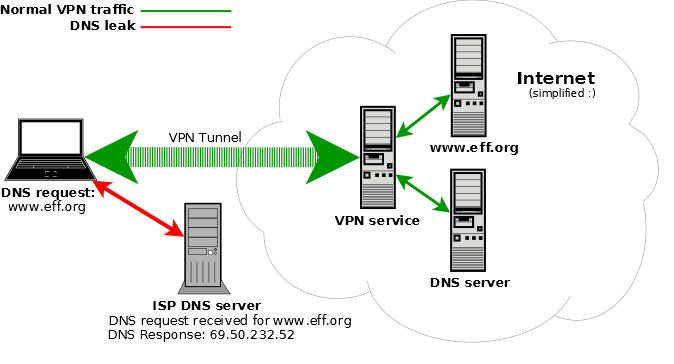
In the world of cyber security, DNS leaks are becoming an increasingly concerning issue. As technology advances, so do the potential risks associated with it. And while you may think that your internet security is safe, a DNS leak can put your data and identity at risk.
So what is DNS leak? How can you avoid it in the future?
In this article, we will take a look at what DNS leak is, why it’s so dangerous, and how to protect yourself against it in 2023 and beyond.
What is DNS leak?
When you connect to a VPN, all your internet traffic is routed through that VPN server. This means that your ISP can no longer see which websites you’re visiting, since the traffic is encrypted and routed through the VPN server. However, your ISP can still see that you’re connecting to a VPN server—they just can’t see what you’re doing once you’re connected.
This is where DNS leak comes in. DNS leak is a security flaw that can expose your real IP address even when you’re using a VPN.
It happens when your DNS requests are sent outside of the encrypted tunnel created by your VPN connection. This means that your ISP (or anyone else) can see which websites you’re trying to visit, even though they can’t see the actual content of those requests.
DNS leak is a serious security flaw, and it’s important to be aware of it so you can avoid it. There are a few different ways to do this:
• Use a VPN with built-in DNS leak protection: Many premium VPN providers offer this feature, so it’s worth looking into if you want comprehensive protection against DNS leaks.
• Manually configure your DNS servers: If your VPN doesn’t offer built-in DNS leak protection, you can configure your DNS servers manually. This requires more technical knowledge, but it’s not overly difficult to do.
• Use a public DNS service: This is the easiest option, and it doesn’t require any technical
Best VPN for DNS Leaks
HideIPVPN offers a VPN service with military-grade encryption, and high-speed servers with unlimited bandwidth.
Our service comes with shared IP addresses so that your activity can never be tied to one particular user, further protecting your privacy.

We also offer DNS leak protection, a Kill Switch, the latest VPN protocols, and a guaranteed no-log policy.
Best VPN Deal! Get HideIPVPN for $2.7/mo!
Every purchase you make comes with a 30-day money-back guarantee.
What are the consequences of DNS leak?
 When your DNS leaks, it exposes your internet activity and habits to your ISP (internet service provider). This can include the websites you visit, the searches you perform, and the content you stream or download. Your ISP can then use this information to sell ads, throttle your connection, or even hand over information to the government.
When your DNS leaks, it exposes your internet activity and habits to your ISP (internet service provider). This can include the websites you visit, the searches you perform, and the content you stream or download. Your ISP can then use this information to sell ads, throttle your connection, or even hand over information to the government.
DNS leak protection is a must if you want to keep your online activity private. A VPN with a strict no-logs policy and strong security features will protect your DNS traffic and keep your ISP from snooping on you.
We recommend HideIPVPN as the best VPN for DNS leak protection.
How to avoid DNS leak in 2023?
2023 is the year when the next generation of internet protocol, IPv6, is scheduled to be fully deployed. This new protocol will replace the current IPv4 protocol, which has been in use since 1981.
One of the key benefits of IPv6 is that it will vastly increase the number of available IP addresses. This is important because the current system is running out of IP addresses.
However, there is a potential downside to this switchover. The new IPv6 addresses are not compatible with the old IPv4 addresses. This could cause a problem called DNS leak.
DNS leak happens when your computer tries to access a website using its IPv6 address but the website only supports IPv4. Your computer will then try to find the website using its fallback DNS server, which could be located anywhere in the world.
This would allow someone to snoop on your internet activity and see which websites you are visiting.
To avoid DNS leak, you need to make sure that your computer is only using its IPv6 address when it accesses websites that support IPv6. You can do this by disabling IPv4 altogether or by using a VPN that only supports IPv6 traffic.
By taking these steps, you can ensure that you won’t have any problems with DNS leak in 2023.
What are some alternative solutions to DNS leak?
 There are a few ways to avoid DNS leak. One way is to use a VPN that supports DNS leak protection.
There are a few ways to avoid DNS leak. One way is to use a VPN that supports DNS leak protection.
Another way is to configure your computer’s DNS settings manually.
You can also use a public DNS service such as Google Public DNS or OpenDNS. Finally, you can disable IPv6 on your computer to prevent DNS leak.
Coonclusion
A DNS leak is a security flaw that can expose your real IP address to malicious actors. If you’re using a VPN, a DNS leak can defeat the purpose of the VPN by revealing your true location.
There are a few ways to avoid DNS leaks. First, make sure you’re using a reputable VPN service with robust security features.
Second, check for DNS leaks before connecting to your VPN by running a test like the one offered by Perfect Privacy.
Finally, keep an eye on your connection status while using your VPN to ensure that it’s not leaking any information.



